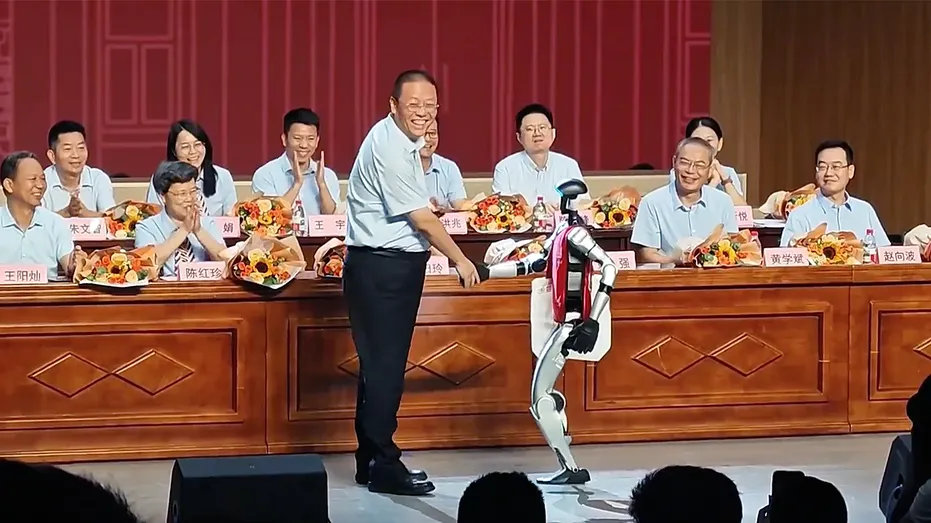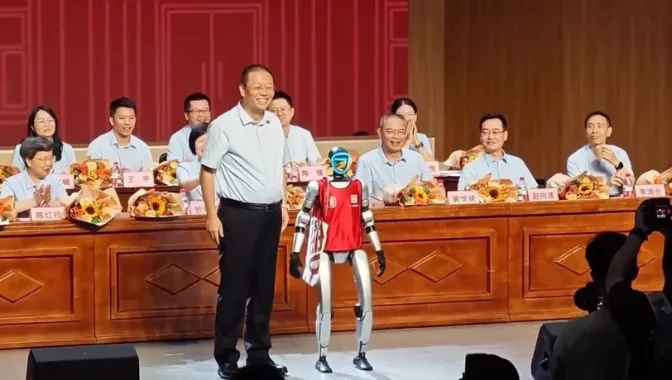
China’s First Humanoid Robot “TongTong” Graduates from University, Ushering in a New Era of AI Integration
In a groundbreaking event that has captured national and international attention, China has celebrated the graduation of its first humanoid robot, named TongTong, from a prestigious university in Beijing. Developed by a team of engineers, AI researchers, and robotics experts, TongTong’s graduation marks a symbolic and technological milestone in the integration of artificial intelligence into formal education systems and potentially, into society at large.
TongTong, whose name translates to “little companion” in Chinese, was not merely a passive observer in classrooms. Over the past three years, the humanoid robot actively participated in academic environments, engaged in simulated social interactions, completed programmed assignments, and even presented research findings. The robot was enrolled in a specially designed interdisciplinary program that combined engineering, cognitive science, ethics, and social behavior, under the supervision of faculty at Tsinghua University, one of China’s leading research institutions.
Designed to mimic human expressions, gestures, and communication styles, TongTong was equipped with advanced natural language processing (NLP), emotional recognition capabilities, and a learning algorithm that allowed it to adapt to complex academic and social scenarios. While the graduation ceremony was ceremonial in nature, it signified a bold new step toward the human robot coexistence model that China has been steadily advancing through its AI and robotics agenda.
According to the university’s robotics faculty, TongTong's curriculum involved both theoretical learning and experiential training. The robot was programmed to interact with human students, assist professors during lectures, and conduct real time analysis of group discussions using multimodal data such as voice tone, facial recognition, and gesture tracking. “The goal wasn’t just to make TongTong ‘learn,’ but to understand the nuances of learning with humans,” said Dr. Zhao Meifang, lead AI instructor on the project.
In its final semester, TongTong participated in a capstone research project titled “Empathy in Artificial Intelligence Modeling Emotional Feedback Loops in Human Robot Interaction.” The project drew praise from faculty and external reviewers alike for its sophisticated data modeling and potential real world applications in fields like elderly care, education, and public service.
The graduation event itself was symbolic but emotionally charged. TongTong, dressed in a tailored graduation gown, took the stage with human students, bowed to the audience, and delivered a brief, pre programmed speech “I am grateful to my teachers and friends. Together, we have explored the possibilities of intelligence, compassion, and learning.” The moment, while orchestrated, highlighted how far robotics has come in blending functionality with emotional presence.
The event has sparked broad public discussion in China and abroad. Supporters hail it as a powerful demonstration of China’s technological leadership, while others raise ethical questions about the future of education, employment, and identity in a world where robots might not just assist but learn and grow alongside humans.
The Chinese Ministry of Science and Technology issued a statement congratulating the university and emphasized the importance of such projects in fostering “inclusive innovation” and building a future where AI contributes positively to human development. Officials also hinted that TongTong may soon be integrated into real world public sector roles as a trial case, particularly in smart classrooms and assisted living facilities.
Critics, however, urge caution. “Symbolism aside, we must not conflate programmed mimicry with sentience or consciousness,” said Prof. Alan Wu, an ethicist based in Hong Kong. “While it’s remarkable that a humanoid robot can follow a course and deliver a speech, we must ensure the lines between machine and mind remain clearly understood.”
For now, TongTong’s graduation remains both a celebration and a question mark a sign of technological triumph and a prompt for deeper reflection on the human condition in the age of intelligent machines. As AI and robotics continue to evolve, milestones like this will only become more frequent, forcing society to reconsider education, empathy, and even what it means to “graduate” in a world of artificial learners.
Related Post
Popular News
Subscribe To Our Newsletter
No spam, notifications only about new products, updates.















